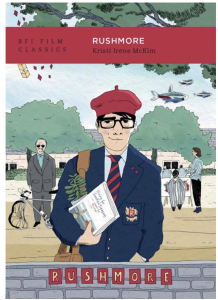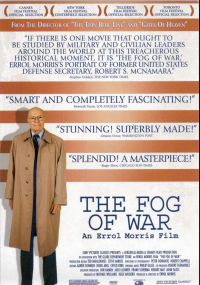




• Jeff on Ghost World.
• Jeff on The Fog of War.
• The new British Film Institute monograph on Wes Anderson's Rushmore.
________________________________________________________
Famously, film writer David Thomson dismissed Wes Anderson in one short sentence.
Thomson has a book called The Biographical Dictionary of Film, first published in 1975, and expanded and revised some six or seven times through two publishers. Each book had about 500 to, later, 1, 300 entries of varying lengths, from a filmography and three or four paragraphs, to several pages, depending on the stature of the subject, be they directors, producers, actors, or actresses.
In the volume for 2002, nuzzled next to Paul Thomas Anderson, Mr. Thomson’s entry reads in total: “Watch this space. What does that mean? That he might be something one day.”
WTF?, as they say. Why did Mr. Thomson abrogate his critical “responsibility,” as it were, to list the name, but pose no opinion? Why waste the space, minimal as it was?
Well, if you watch a different space, 24 years later in 2024, with 13 additional films added to Wes Anderson’s filmography, there are some 10 books on his career and counting (a few fewer on Paul Thomas Anderson so far, but also counting).
Eventually, Mr. Thomson revisited Wes Anderson in the volume for 2012, two books later, and added these thoughts:
“What I meant to say was that Wes Anderson seems to me enormously promising if not yet clarified … If pushed further, I would’ve said then that Rushmore was one of the best films about high school age kids … I liked it very much, but felt already that the Royal Tenenbaums had a kind of whimsical pretension that can mark and beguile a student who has given up on being educated … In the years since, the Wes Anderson cult built, along with the sense that he is central to the most valuable young generation America has brought to film in 30 years… So far, so good. Watch this space …
“Alas, The Life Aquatic, and the Darjeeling Limited did not feel or occupy the space — they lost it. These are two pretty awful films, and I see no reason not to say that … I think the comparison with Paul Thomas Anderson is a signal. PTA’s films have been odd and disconcerting at times, but overall they leave no doubt about the maker’s sense of trying to make films in a time of immense physical and cultural crisis. By contrast, WA seems to exist at the far end of a very private isolating corridor. Moonrise Kingdom seemed to exist on an island at the far end of the corridor: It was pretty, whimsical, and consistent, but what was the point?”
Mr. Thomson has provided us with a series of readably argumentative volumes in this series, but I don’t understand the motivation here, while one comment he made in the forward to his third edition evinced weariness, concluding that books are better than movies. His thoughts could be well echoed today, as the working reviewer sees dozens of uniformed (and uniform) super-hero movies, violent action comedies, video game adaptations, as well as soulful autobiographical anecdotes, and thinly disguised political tracts. This weariness can be detected in the way he updates his articles. He rarely if ever completely rewrites them, but rather adds an addendum that seems ill-ly jigsaw-puzzled into the entry, displays minimal keeping up with the new movies, and sometimes doesn't notice that the subject of the entry has died in the interim.
In 2012, Sight and Sound readers voted The Biographical Dictionary of Film the greatest movie book of all time.
Kristi Irene McKim’s 97-page monograph for the BFI is neither the first, and surely not the last book on Wes Anderson. She focuses on Rushmore, but her thoughts “and observations apply to films of that phase in his career (less so to the more ornate recent films).”
Professor McKim is Professor of English, Film, and Media Studies at Hendrix College. She is author of Love in the Time of Cinema (2011) and Cinema as Weather: Stylistic Screens and Atmospheric Change (2013) and her work has appeared in Senses of Cinema, and Camera Obscura.
As usual, this latest book in the BFI Film Classics series packs in a lot of information and observations. I’ll let her summarize the contents:
“Chapter 1 offers a brief artist history and a summary of criticism and scholarship. Chapter 2 takes up Rushmore’s bravado, speed and excess within montage sequences that compress time. [ This is the section in which she charts the use of songs in the film, one of the most valuable parts of the book.] Chapter 3 counters the speed by attending to the grace and sensitivity that arise in moments of pause and slowness, in looks and gestures that elongate the film. Chapter 4 combines these temporal modes of speed and slowness to argue that Rushmore’s legacy emerges less in its materiality than in the cinematic opening Rushmore’s exclusive lineage to new kinds of learning. Chapter 5 foregrounds this pedagogical concern with an explicit focus on teaching and education within Rushmore. While chronology structures Chapters 1–3, the final two chapters approach Rushmore conceptually, easing textual pressure for a more porous reading experience.”
She goes on to summarize:
“This book offers an urgent corrective to what might be perceived as an endearing portrait of exceptionalism, entrenched in perpetuating a status quo power. Marketed with the tagline ‘Love, Expulsion, Revolution’, Rushmore reveals the quickness with which a schoolboy crush can escalate into assault, for example, as it teaches us to see with tenderness the softening of such shrillness and exaggerated drive, the emotional resonance that includes but transcends character, therein becoming – through warmth and humour – a grander site of learning for the audience beyond the film.”
She also reminds us that this is a book about Rushmore, not a work about Wes Anderson's entire output:
“Though glancingly referring to such history and context, this book appreciates Rushmore for its own sake, harnessing its vitality and force, its complexity and evocation. I situate Rushmore as a film for the twenty-first century. Invested in hope and healing, in grief and finding light, in joy and community, this book – built from years of vibrant classroom discussion – reflects the polyvocality and mutual enlivening of teaching and learning.”
As you can tell from from the octopenultimate word in that last sentence, the author is prone to some flights of academic jargon that inhibit complete understanding while sometimes skewing the text towards sometimes ill fitting associations with contemporary politics. For example, when discussing the montage sequence set to a song by The Who, she writes.
“Referring in title to fast and secret sex, ‘A Quick One …’ invites nostalgia for any moment of hubris or foolishness when we thought ourselves triumphant, emergent, proud in our skin, ennobled in the world, however naively (the pleasure of Max’s play-acting here is further a privilege of his whiteness, as innumerable Black male teenagers have had their lives tragically cut short, not given the benefit of the doubt or a chance to learn, relative to law enforcement or neighbourhood watch).”
Depending on your perspective, this will either strike you as gratifyingly sensitive or irrelevantly intrusive.
But to show that considering the film not all a matter of numbers and themes, she writes:
“Rushmore thrills me for what film – not just this film, but any film, or any good film – can be: an energising and multitudinous form that looks forward and backwards, that conjures vivacity, that restores life.”
It's a nice way to end of the book.
- KBOO


